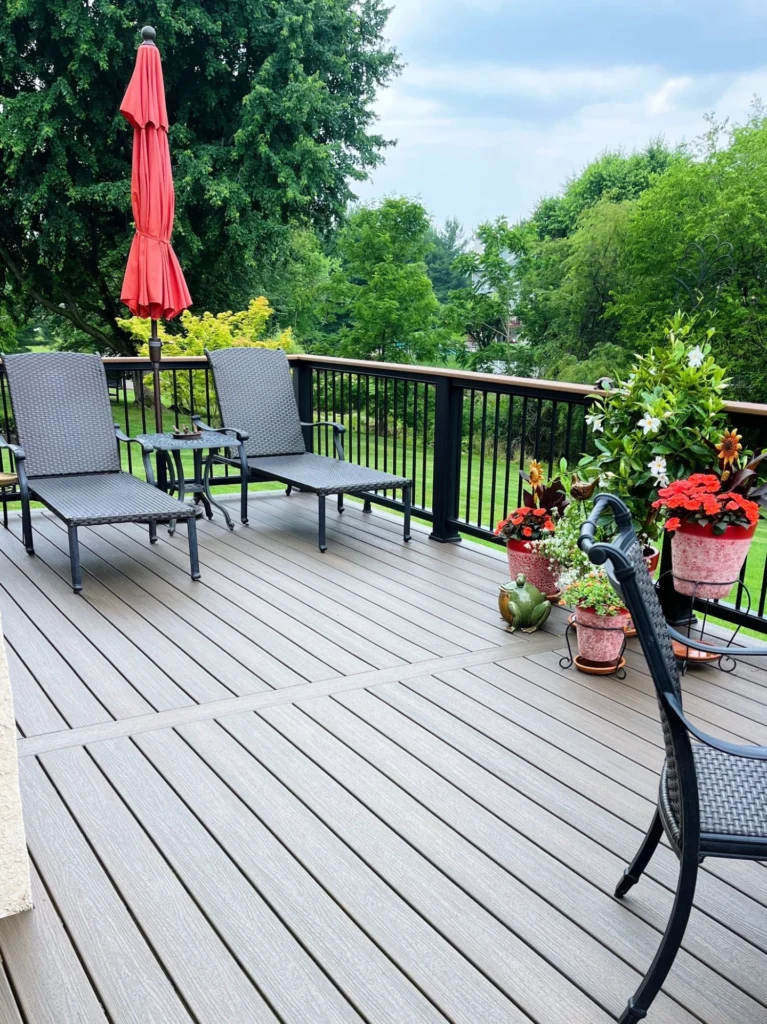
When planning a new outdoor space, composite decking is often considered an attractive and low-maintenance option. However, many homeowners find themselves wondering: How much does composite decking cost? Understanding the costs involved in composite deck installation is crucial for making an informed decision and budgeting effectively. In this post, we will break down the factors that influence composite decking costs, the benefits of using composite materials, and key considerations to keep in mind when planning your project.
What Is Composite Deck Installation?
Composite decking involves constructing a deck using composite materials, which are typically a blend of wood fibers and plastic. This combination results in a durable, low-maintenance alternative to traditional wood decking. While the upfront cost of composite decking may be higher than that of wood, the long-term savings on maintenance and repairs make it a popular choice for homeowners looking for a lasting, hassle-free outdoor solution.
Key Factors That Affect Composite Deck Installation Costs
The cost of composite decking can vary significantly based on several factors. Understanding these variables will help you better estimate your budget and avoid unexpected costs.
1. Size of the Deck
The larger your deck, the more materials and labor will be required, which will naturally increase the cost. For example, a 10×10-foot deck will cost less to install than a 20×20-foot deck.
2. Material Quality and Type
Not all composite materials are created equal. Some brands offer higher-quality products with better durability and warranties, but these tend to come at a premium price. Choosing between budget-friendly options and premium brands will significantly impact your overall cost.
3. Labor Costs
Labor costs vary based on the complexity of the installation and your location. In some areas, skilled labor may be in high demand, leading to higher installation costs.
4. Deck Features
Additional features such as railings, stairs, lighting, and custom designs can add to the total cost. If you opt for intricate designs or high-end railings, expect to see a rise in both material and labor costs.
5. Location and Accessibility
If your site requires special preparation or if the deck is difficult to access, such as on a steep slope or in a hard-to-reach area, this can increase labor costs and make installation more complicated.
Advantages of Choosing Composite Decking
Composite decking is known for its many advantages over traditional wood decks, which can justify its higher initial cost. Here are some of the key benefits:
1. Low Maintenance
Composite decks require little upkeep compared to wood. Unlike wood, composite materials won’t splinter, warp, or rot, and they don’t need to be stained or sealed regularly. A simple wash with soap and water is usually all it takes to maintain your deck.
2. Durability
Composite decks are designed to withstand the elements better than traditional wood. They are resistant to mold, mildew, and insect damage, which ensures they last longer and require fewer repairs.
3. Environmental Impact
Many composite decking materials are made from recycled materials, which helps reduce the demand for new timber and minimizes environmental impact.
4. Aesthetic Appeal
Composite decking comes in a variety of colors and textures, allowing you to choose a design that matches your style. Unlike wood, which can fade or discolor over time, composite materials maintain their look for years.
Important Factors to Consider Before Installing a Composite Deck
Before you proceed with your deck installation, there are several factors to consider to ensure you get the best value for your investment.
Budgeting for the Full Project
While the initial cost of composite decking may be higher than wood, the overall savings in maintenance costs can be significant over time. Be sure to factor in the total cost of installation, including labor, materials, and any additional features or customization.
Choosing the Right Contractor
Hiring a skilled contractor with experience in composite deck installation is essential. A professional will ensure that the deck is built properly and meets local building codes, which can prevent costly mistakes down the line.
Maintenance Over Time
While composite decks require less maintenance than wood, they still need periodic cleaning. Be sure to ask your contractor about care instructions to ensure your deck lasts for years.
Debunking Common Myths and Misconceptions About Composite Decking
Many homeowners have misconceptions about composite decking that can lead to frustration down the line. Here are a few myths debunked:
- Composite Decking Is Maintenance-Free
While composite decks are low maintenance, they’re not entirely maintenance-free. Cleaning your deck regularly and addressing any stains promptly can keep your deck in top condition for years.
- Composite Decking Will Not Fade
Some composite decking can fade over time, especially in direct sunlight. Make sure you select a high-quality composite material that offers UV protection to minimize fading.
- Composite Decking Is Too Expensive
While the upfront cost of composite decking can be higher than wood, its long-term savings on maintenance and repairs often make it the more affordable option in the long run.
Contact Us Today!
Composite decking can be an excellent choice for homeowners seeking a durable, low-maintenance outdoor living space. While the upfront cost may be higher than traditional wood, the long-term benefits often outweigh the investment. If you’re considering this option, be sure to carefully plan your project, choose the right materials, and hire an experienced contractor. For a detailed estimate or to schedule your composite deck installation, contact Clean Cut Deck Builders at (215) 913-3829 today!
Frequently Asked Questions
How long does composite decking last?
Composite decking typically lasts between 25 to 30 years with proper care, significantly outlasting traditional wood decking.
Can composite decking be repaired if damaged?
While composite decking is durable, it can sometimes be scratched or damaged. However, repairs are usually easier and less costly compared to wood decking.
Is composite decking better than wood decking?
While wood decking offers natural beauty, composite decking is more durable and requires less maintenance, making it a better long-term investment for many homeowners.


